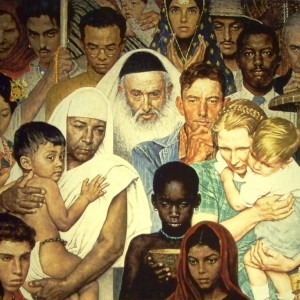Shaping Theme in Acts: Unity.
Think about the people in your life – the relationships you have. Try to picture the people that you are connected to, that are connected to you. Is it a lot of people? Is it just a couple people? Try to line them up on a scale from “most connected” to just “acquaintances.” Picture these people. What connects you to them?
Being connected to people is absolutely central to what it means to be Christians together. Our connectedness to one another is at the core of being Christians and being the church. Revisiting the foundational elements of what it means to be the church, we now land on a final theme: unity. With Acts 4:32-35 as our base passage, we’re going to look back on how the early church was united, and what it means for us.
The Breadth of Unity in the Early Church
Notice the word choices in our verses: “Now the full number . . . . no one said . . . . There was not a needy person among them, for as many as were owners of lands or houses sold them . . .” (vv. 32 & 34). What we have here is not the result of an exhaustive survey. Not literally every person was doing this (remember Ananias and Sapphira), yet the pervading characteristic of the early church was not disunity, but unity.
The early church did not have separate denominations that wouldn’t work together, they didn’t have separate churches in separate subgroups for every subculture that didn’t worship together, and they all seemed to be together in a sense that it was different – and it was remarkable. Within the church, the rich and the poor were united. Their unity in Christ blasted right through the barrier of economic differences. It also blasted through racial and language differences. The church was remarkably, comprehensively, broadly united.
In response to this, we should expand our expectations for what our unity could look like. We should once and for all, by the power of God through Jesus Christ and the Holy Spirit, put to death our instinct to be selective in who we will be united with. Our instinct is to unite with people who are just like us. It’s natural. But we are not natural people anymore, we are spiritual people – and part of putting off the old self and putting on the new self is putting off a selectivity about who will be united with.

The Depth of Unity in the Early Church
Verse 32: “Now the full number of those who believed were of one heart and soul, . . .” Your heart is the center of your being. The soul can either refer to your source of life or the source of your thoughts. The picture is clear: the early Christians were united down deep from the core of who they were, how they thought, and where their life came from.
The biblical call to unity is not a superficial call to socialize more. It’s recognizing and living in light of our deepest bonds that we share with every other Christian just by virtue of being believers. Anybody can socialize, but we’re not anybody: we are Christians. We are connected on a level much deeper than a shared economic situation, deeper than a shared cultural background, lifestyle, preferences, race, or life-stage. Our fellowship is broad because it is deep.
Let’s expand our expectations and determination for what unity can look like in terms of breadth, but also in terms of depth. Don’t settle for connecting on a level of sports and the weather. Let’s recognize and live in light of the deeper bonds that we have. We have had our sins forgiven and blotted out. We have received the same Holy Spirit. We have been called by the Lord God unto Himself.
Practical Application
With whom are you connected? If you are a Christian, it’s every believer! This is our reality. We trust in Jesus Christ because of His resurrection, but we don’t do it alone, we do it together. We follow Jesus Christ because of His authority, but we don’t do it alone, we do it together. You can’t be a Christian out on your own – the unity in Christ is too central to what it means to be a Christian.
The unity in the early church was broad and deep, and it had practical applications. In this passage, their unity in Christ expressed itself in this way: They helped each other. They stopped saying their stuff was their stuff and shared it (vv. 34, 35). Our unity in Christ is not just theoretical – it effects the way we live, the way we act, and the way we treat one another.
Because of Jesus Christ, we are free to be here for one another, deeply united across every single barrier.
From the sermon series: Shaping Themes in Acts.
Discussion Starters
- Read Acts 4:32-35 and discuss it together.
- Who are the people you are connected with?
- Why might you not connect with people who are different from you?
- What are the dangers of having “selective unity”?
- Because of the bond we have in Christ, how should we interact with each other?
- Can you be a Christian without connecting with other Christians?
- Why or why not?
- Are you connected with other Christians?
- How did the unity in the early church express itself?
- How should our unity affect the way we view church?
- How should our unity affect the way we live and act?








